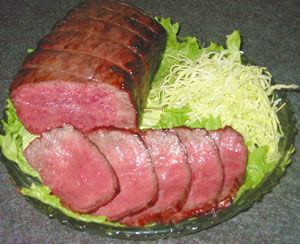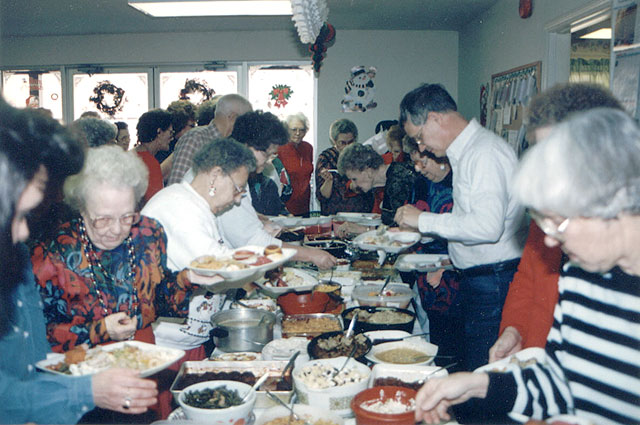Community gatherings around food awaken nostalgic feelings of the rural past — times when an entire town would get together monthly, eat, enjoy company and work together. And also, as Rob Tauxe says in an article about new trends in foodborne pathogens, have created some of the easily traced foodborne illness outbreaks:
The traditional foodborne outbreak scenario often follows a church supper, family picnic, wedding reception, or other social event. This scenario involves an acute and highly local outbreak, with a high inoculum dose and a high attack rate. The outbreak is typically immediately apparent to those in the local group, who promptly involve medical and public health authorities. The investigation identifies a food-handling error in a small kitchen that occurs shortly before consumption. The solution is also local.
In 1997, two elderly people died, more than 100 made a trip to the emergency room, and 700 more reported feeling ill after an annual church dinner of stuffed ham, turkey and fried oysters at Our Lady of the Wayside Parish in Chaptico, Md., population 100. Tests showed that Salmonella in the ham likely caused the illnesses. 
In September 2004, near Buffalo, N.Y., 28 confirmed cases of salmonella infection were reported following an annual community roast-beef dinner. Volunteers were not trained in food service and "didn’t quite understand the importance of maintaining a hot or cold temperature," investigators said.
The nasty bugs that cause foodborne illness don’t distinguish between commercial and charitable food operations.
The newest food safety infosheet focuses on a recent outbreak of Salmonellosis linked to a church fundraiser in Conway, SC. It’s not entirely clear what factors led to the outbreak, but what is apparent is that over 125 of the 1,500 participants had were left with foodborne illness symptoms including abdominal cramping, diarrhea and vomiting after their BBQ plates were consumed. Fourteen individuals were hospitalized.
To download this week’s infosheet, click here.

 State epidemiologist Dr. Tom Safranek said the outbreak was caused by roast beef served at a reception hall in Sarpy County for a private gathering of 50 to 60 people on March 26. Safranek further noted the meat was prepared at a person’s home and brought to the event, but he would not say where the meal was served or what the gathering was for.
State epidemiologist Dr. Tom Safranek said the outbreak was caused by roast beef served at a reception hall in Sarpy County for a private gathering of 50 to 60 people on March 26. Safranek further noted the meat was prepared at a person’s home and brought to the event, but he would not say where the meal was served or what the gathering was for. The editorial says that in recent years as well, community groups and Legions have been under the gun on matters of food preparation. One bad batch that causes food poisoning can bring the wrath of officialdom as well as public opinion down on a group.
The editorial says that in recent years as well, community groups and Legions have been under the gun on matters of food preparation. One bad batch that causes food poisoning can bring the wrath of officialdom as well as public opinion down on a group.